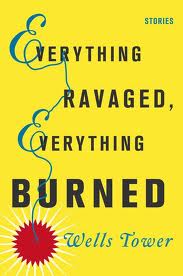
Everything Ravaged, Everything Burned by Wells Tower. New York: Picador, 2009. Review by Sharon Harrigan
Not since Lorrie Moore’s Birds of America has a short story collection excited me so much with its irrepressible, in-your-face humor and rule-breaking anti-heroes. Towers made me want to try doing what he does. It looks like so much fun.
The stories are about hopeless losers who don’t find redemption. Most are in first person, from the loser’s point of view, which usually inspires empathy. But it doesn’t in this case. These characters blithely follow their own excesses to a wild ride of self-destruction. It’s amazing that Towers manages to keep us turning the pages, anyway, faster and faster. He does it by making the language inventive and clever, by weaving in a deft thread of suspense, and by making the characters insightful and funny.
Tower shows a remarkable versatility. In addition to the first-person stories, he has a story in the second person (“Leopard”) and third-person omniscient (“On the Show”). The title story, historical fiction from the point of view of a Viking plunderer, stretches his versatility the furthest and is the only one in which the novelty became too apparent for me.
The narrators range through a middle aged real estate developer in a hate-hate relationship with his brother and the world, a twenty-four-year-old engineer/inventor, a nine-year-old boy who chronically lies and dreams of beating up his stepfather when he turns sixteen, a sixteen-year-old girl who would rather put herself in danger of rape than suffer the embarrassment of being seen with her father, and a seventy-three-year-old man who knocks on his neighbor’s door hoping she’s a prostitute and discovers she’s a drug dealer. What these characters have in common is their obnoxiousness, which stops just short of evil. But because they are rude, sarcastic, and unfiltered, they can say anything they want, and what they say is often extremely funny.
Two of my favorite stories were “On the Show” and “The Brown Coast.”
“On the Show” includes multiple plot threads and gets into the heads of several different characters, making for a complex architecture. It’s omniscient, so it juggles readers’ attention from character to character. Towers pulls it all together by making it clear by the end that one plot line dominates (the question: who is the pedophile who lured the seven year old boy into the bathroom?) I thought it was Ellis, one of the carnies, but we only find out at the very end that it is the cattle contest judge, an icon of civic fortitude flown in from out of state, who did it. No one in the story finds out, but we are privileged, through omniscience, to get in the perpetrator’s head. This was the most complicated story of the collection, and it left me breathless.
“The Brown Coast” I found interesting because of its inverse climax. Unlike the traditional arc (building to more and more tension and rising until the conflict bubbles over, then coming down to equilibrium), it starts out with tension and conflict, builds to a climax that is a rare moment of euphoria, then the falling action leads us back to the pile of shit we started in. The narrator has invited his estranged brother to visit him in his cottage in Maine. They have a history of cruelty to each other, which is undiluted by maturity.
But something happens that promises to change all that. They go hunting and, miraculously, the narrator shoots a moose. The narrator, his buddy, and his brother clean and dress the beast in an operatic ritual of male bonding. The brother–a failed classical composer forced to eek out a meager living as a music therapist–considers moving out to Maine, which promises to enlarge his soul with manliness. They all expend a hero’s effort to haul the animal back to the cottage, and nothing will ever by the same, we think. Until the meat starts to rot. The animal was sick, and his virus is spreading fast after his death. The brother and buddy refuse to eat it, but the narrator, always in denial, ends the story by taking a big bite of rancid meat.
Meanness can be funny, and this book is hilarious. Partly it’s the juxtaposition of unexpected words in the same sentence, like “with sunset still smoldering behind the molars of the Appalachian range.” The self-loathing is funny, too, such as “Matthew, he repeated, in the way you might say ‘cancer’ after the doctor’s diagnosis.”
But the book is more than funny. When you read: “The land here met the water in a steeply sloping apron of mud that sang with mosquitoes and smelled terribly of fart gas,” you know you’re in for a lyrical roller-coaster ride that is dark, metaphorical, sensual, complex, hilarious, profane, and rollicking fun.
To the sharonharrigan.net owner, Your posts are always well thought out.
Hi sharonharrigan.net admin, Your posts are always well structured and easy to follow.
Hello sharonharrigan.net admin, Excellent work!
Hello sharonharrigan.net webmaster, Your posts are always well-delivered and engaging.
Hello sharonharrigan.net admin, Your posts are always well-formatted and easy to read.
Dear sharonharrigan.net admin, Your posts are always well organized and easy to understand.